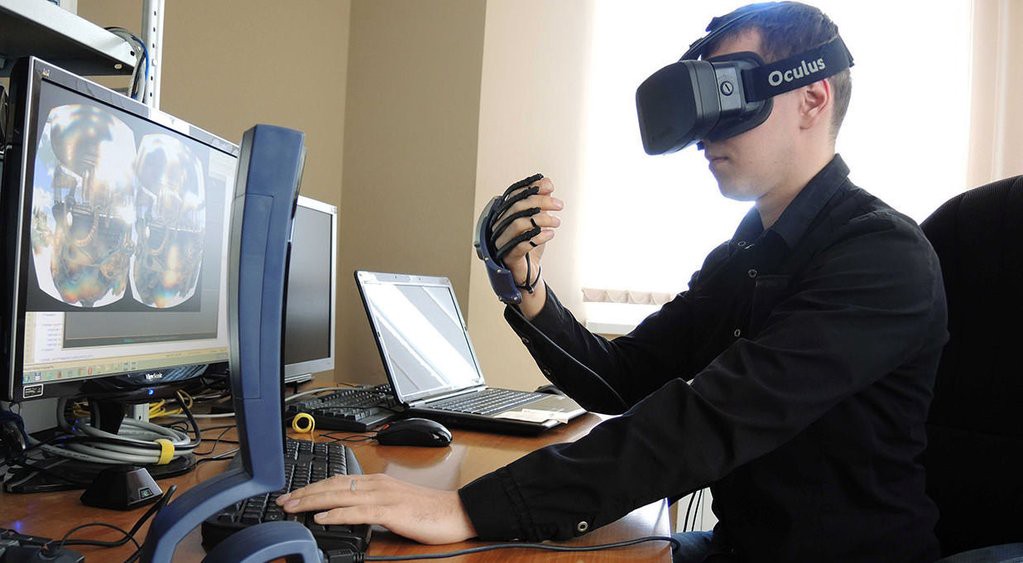According to the Harvard Business Review, 70% of employees report that they don’t have mastery of the skills needed to do their jobs, and a lack of training is most often to blame.[1] This raises questions: How can HR professionals improve the training outcomes for businesses across the board? Can emerging technology show the path forward toward more effective training?
Integrating technology into the human resources (HR) road map isn’t a new idea in itself, but in 2020, as organizations navigate new frontiers in remote work during the COVID-19 pandemic, some emerging technologies are gaining new traction. One of those is virtual reality (VR), which has proven to be an effective means by which some of the world’s leading organizations have conducted training remotely. VR isn’t just a solution for the pandemic, though—it can help HR professionals address common training challenges and improve outcomes in their workforce. Here’s how:
Addressing Training Challenges
HR executives face a number of different challenges when it comes to workforce training—and VR technology can be helpful in addressing each of them.
Recruiting. An essential part of recruiting talent is offering potential hires a glimpse of what it’s like to be a part of your organization. VR can help here, offering a prospective employee an opportunity to experience job duties through simulations. It can also help the organization determine if those potential hires are able to complete essential job tasks. A big-box distributor, for example, can run a recruit through a picking-and-sorting simulation, asking them to work with virtual equipment and making similar physical movements in a virtual warehouse.
Onboarding. Remote employees may face the fact that they will never step foot in their organization’s location—at least any time soon. With the possibilities of VR, however, HR teams can create immersive videos throughout the organization (shop floor, lobby, manufacturing lines and more) to help new hires gain a deeper understanding of and connection with their organization’s processes and teams.
Technical Training. What used to take job shadowing and one-on-one training can be recreated with VR training. A national beverage distributor, for example, can train employees on newly installed complex machinery that uses robotic technology to assist in the distribution of beverage cases through virtual reality simulation. By recreating the distribution center and having the employee run through safety protocols and operate the virtually recreated machines, the employee can walk on the distribution line and work the equipment without job shadowing or in-person training.
Leadership Training. Now more than ever, businesses need empathetic leaders that will help sustain and grow their organizations. VR technology can help create immersive 1:1 experiences where leaders and managers can work through difficult conversations or figure out how to diffuse a tense situation. The VR activity can bring real emotions, feedback and reactions without a face-to-face interaction.
Tracking Metrics and KPIs
VR collects a unique set of metrics that give HR and management insight into employee development. Traditional training can measure things like completion rates and assessment decisions, but VR can offer executives more granular insight into how trainees respond to and interact with their training environments.
For example, VR offers the opportunity for organizations to expand what they measure, such as eye tracking (what the user looks at and when), body positioning (how arms are angled or positioned) and object interactions (how the user stacks virtual boxes in relation to each other). VR technologies can also track action-based responses, where next steps are automatically triggered by user action.
VR Training in Action: Success With Aspen Dental Learning Programs
VR has demonstrated significant real-world success. Recently, Aspen Dental Management, Inc. (ADMI) partnered with Roundtable Learning to create a custom-blended learning program for office managers of the Aspen Dental-branded practices that ADMI supports to educate on the importance of dental implants. The learning program used instructor-led-training, custom e-learning and 360° VR.
With the growing interest and popularity for dental implants from doctors and patients, ADMI’s clinical support team identified the need to provide education on dental implants to all Aspen Dental offices across the country so that dentists, in turn, could offer the treatment solutions that they believe are best for their patients. ADMI provided training on the entire implants process from understanding how to track an order to implant restorative training for doctors, led by ADMI’s Senior Vice President of Implant Services Dr. Sundeep Rawal.
The 360° VR activity was an interactive facet to the training program for the office staff that would reinforce a foundational understanding of the implants process and help them talk with patients about dental implants, allowing participants to practice without sacrificing the patient experience. ADMI SMEs and Roundtable extended reality designers collaborated to create a virtual reality component of the training that leveraged 360° VR to simulate various customer conversations that the staff may face when consulting with patients. Roundtable Learning designed the scenarios using Aspen Dental office environments and real-life actors who were carefully selected to represent patients.
While organizations everywhere are facing new challenges brought by a changing world, there are opportunities to succeed. VR represents an effective tool that HR executives can leverage to make an impact on their organization.













